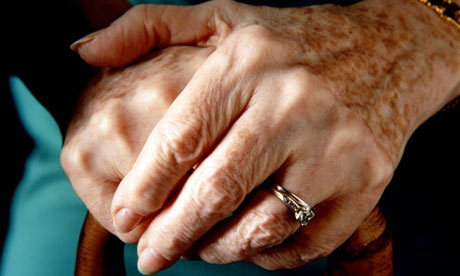
Nothing bad comes without a little good on the side, my mum used to say. Like so many millions of others, she died of Alzheimer's, but what hurt most of all was that she died so young. She was only 63.
My mother was fit. When she became ill, she looked and sounded like she always had. What gave her away was that more and more often she asked for one thing while she wanted something else – she got the nouns mixed up. Several times she asked for a pillow and what she really wanted was a cup of coffee. When I began to think that pillow meant coffee, it changed to something else.
On one occasion she asked for a mirror. I opened my handbag and gave her one. She looked at me as if I was totally mad. She then decided that I was probably joking and asked for it again. I still didn't know what a mirror was, if it wasn't a mirror. What she really wanted was a glass. For me, this was like learning a new language, and the biggest problem I had was that the new language changed faster than I could learn it.
Almost all of our conversations took a wrong turn because I couldn't understand what she was trying to tell me or what she wanted. Her doctor told me that this would more than likely only get worse with time. I thought long and hard about what I could do to make life a little easier. That's when I came up with the idea for a book: Lost Words.
I sat up all night and started to make a book with pictures. For example, a lamp and the word lamp underneath it. Next came a picture of an egg and the word egg underneath it. Mum called it the 'yellow book', because of its cover (at least she got the colour right, I thought). We used the book in almost every conversation we had and she carried it with her wherever she went. It was the one new thing that she didn't forget.
I returned home after having buried my mother when, within days, my in-laws arrived on our doorstep from overseas. I hadn't seen them for a few years and the minute they crossed the threshold I knew straight away that my mother-in-law had some form of dementia.
I soon realised that my mother-in-law's illness was worse than I had first thought. My heart stopped at the shock of seeing so many of the same symptoms in my husband's mother as I had seen in my mum. For my own sanity I chose to try to pretend not to notice it. That didn't work. The two women had so many symptoms in common and it was impossible to overlook the similarities and the fact that it was dementia.
My mother-in-law died recently and it has taken me a long time to get as far as sharing the yellow book with all who need it. It isn't a cure, nor will it end all the problems connected with dementia, but it was an enormous help to my mother and I, and I know that it will be for so many others.
During my research for this book I have been told that it could also be of great help for a large number of stroke patients. I have had no contact with that disease and I have no medical background, but I can see that it may help if the patient's memory has failed and they confuse the words for everyday items, whatever illness they suffer from.
If mum was right and there is a 'little good on the side' of her dying from Alzheimer's, it is this book Lost Words. I know it will be a great help for so many who need it and I'm happy I can provide them with it, but...I would have preferred to have my mother around for a few more decades.

